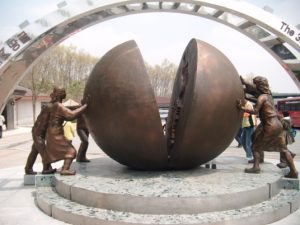Nonlinguistic strategies require students to create a representation of new information that does not rely on language. Marzano, Pickering, and Pollock (2001) define non-linguistic representations as the use of visual, kinesthetic, and whole body systems to acquire and store knowledge. Mental images and physical sensation combined with linguistic modes allow students to better reflect.
This strategy can be used to have students display their understanding of a concept throuh the use of a visual and then explain their thinking behind the image. Students can interact with each other via a discussion online and discuss their reflections based on the image and explanation.
Link to example artifact(s)
The example below is from Dr. Angela Danley’s (University of Central Missouri) course, Teaching Social Studies. Her students (pre-service K-12 teacher candidates) were assigned the task of finding a representation of what “culturally literate” meant to them and to discuss “cultural literate.” Students then participated in a discussion afterwards about the images they selected. The following annotated image is provided by Dr. Danley as an example for her students to follow.
‘”Teachers can incorporate facts and cultural literacy into their everyday routine through books with characters from around the world, writing for change (social problems), projects to solve worldly problems, fundraising for a community issues, listening to others, sharing experiences, news channels, newspapers, music, dance, food, art, and communicating with an exchange buddy. This is a picture I took at the DMZ (Demilitarized Zone) on the border between North Korea and South Korea, where thousands of families were separated.”
Link to scholarly reference(s)
Marzano, R., Pickering, D., & Pollock, J. (2001). Classroom instruction that works. Alexandria, VA: ASCD.
Citation
Danley, A. (2015). Provide non-linguisitic representations to foster reflection. In B. Chen & K. Thompson (Eds.), Teaching Online Pedagogical Repository. Orlando, FL: University of Central Florida Center for Distributed Learning. https://topr.online.ucf.edu/provide-non-linguisitic-representations-to-foster-reflection/.
